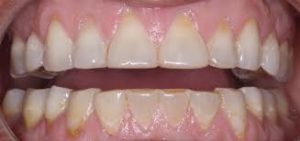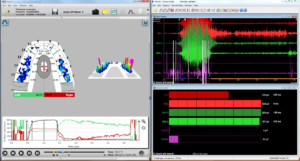
No doubt, we’re in the midst of a stressful time. Combine the stress factors of being limited on social interactions, adjusting to working at home (many while juggling kids!), and worries over meeting financial needs, and there you have it — STRESS.
Feeling stress in our lives right now is normal. Yet, for those who already deal with frequent headaches or occasional migraines, stressful periods may only exacerbate an already active problem. I’m referring to the jaw joints, typically referred to as TMJ.
TMJ (temporo-mandibular joints) are the connection points of the lower jaw (known as the mandible) to the skull. These joints operate in a socket & hinge fashion. They are located just in front of the ears on each side of the head. You can feel these joints in motion by placing your fingers in front of the ears and opening the mouth.
These joints move every time you bite, chew, speak, yawn, and even snore. They get lots of action throughout each day and during your lifetime. Like all parts of the body, their proper function relies on connecting factors, such as muscles, nerves, bone structures, and ligaments.
When the jaw joints are in proper alignment, they move easily and provide balanced support to the cranial structures. So, eating, speaking, and normal day-to-day functions occur without affecting these joints. Yet, like anything that is “off balance,” even slight disparities will eventually rise to the surface in unwanted ways.
The most common cause of a jaw joint disorder is a misaligned bite. This is when the top teeth do not interact with the bottom teeth in a harmonious manner. Bite misalignment can occur at any age. For adults, the shifting of teeth occurs at a faster pace as the aging process shrinks bone structures that support teeth. Losing a tooth can also lead to movement of other teeth.
Although an accident or injury can disrupt the ease of motion in the jaw joints, a “bad bite” is often to blame.
As a Neuromuscular Dentist, what I see are patients who are sometimes surprised to learn their bite is the source of frequent headaches or migraines. Many have seen a dentist who “checked” their bite and labeled it as normal. This is often done with an “articulating” paper that is similar to a carbon paper. The dentist places it between upper and lower teeth and has the patient bite together and then slide their teeth back and forth.
This carbon paper leaves black marks on teeth to show “contact points.” If an position of a tooth or teeth is not “hitting” correctly to others above (or below), the dentist may shave the tooth’s points down to where contact is less abrupt (for the time being).
In Neuromuscular Dentistry, however, we know that these problems typically go far deeper than how a tooth’s points touch another during this “testing” method. The interaction of teeth during the chewing process, speaking, and in their “rested” position involves other facial structures, with the jaw joints being a major player.
Teeth that are not working together in a unified manner – at all times – can stress or strain the TMJ. Over time, these joints become inflamed, extending to surrounding muscles. In turn, this inflammation can activate conditions in other areas.
While it’s not surprising that jaw joint soreness or difficulty opening the mouth fully would be from the jaw joints, the problems can reach further out. Headaches, migraines, ear ringing and dizziness are common symptoms of TMJ disorder. Tingling in the fingers is not uncommon or feeling off balance.
Another common problem related to TMJ disorder is bruxing. Bruxism is when people clench or grind their teeth during sleep. It is triggered subconsciously as strained jaw joints seek out a comfortable restin

Worn Teeth From Grinding
g position. The intensity of bruxing can be severe, leading to cracked, broken or fractured teeth. Some clenching can be so intense the force can crack a walnut.
Worn teeth are a telltale sign of bruxism. Imagine the force of teeth moving harshly back and forth each night. The tops eventually wear down and flatten teeth, sometimes to such an extent they are beyond the protection of crowns (‘caps’).
When TMJ problems exist, repairing broken or worn teeth doesn’t solve the problem. For a neuromuscular dentist, the disparity of the bite must be corrected or the repairs to teeth will be temporary and ongoing. Too, for those who experience headaches and migraines associated with TMJ disorder, only minor and short-term relief may occur with a fix he re or there.
re or there.
My commitment to neuromuscular dentistry includes featuring some of the most advanced diagnostic technology available. In addition to Cone Beam imaging, we utilize Tek-Scan computerized technology to pinpoint specific factors that are contributing to bite problems. “T-Scan” is painless, fast and accurate in its ability to help minimize treatment time.
If you learned that a tire on your automobile was wearing abnormally, it would be of minimal benefit to have that one tire adjusted. The solution would be to have all tires balanced so they were all working together in rotation. When a tire becomes more and more off balance, the entire vehicle begins to vibrate or shake. It’s an illustration of the balance necessary for teeth and the far-reaching effects of ‘malocclusion’.
Unfortunately, people often hear horror stories about treating TMJ disorders. Surgical adjustment of the jaws is a rare need. Effective treatment is more often achieved through selective crown placement, tooth reshaping, and sometimes orthodontics (braces). When orthodontics are needed, we can provide traditional braces or the clear, removable aligners known as Invisalign.
(As an aside here, the clear, mail order aligners on TV can make bite alignment WORSE! Just because teeth “appear” straight in a smile, proper bite alignment is a delicate balance that needs the personal involvement of a specially trained dentist or orthodontist.)
Having beautifully aligned, white teeth are factors in a confident, appealing smile. Yet, having good oral health and properly aligned teeth are the foundation of a smile that will support your overall health and well-being.
No one wants to live with headaches, debilitating migraines, or risk broken or worn teeth. If you suspect you have TMJ disorder, begin with a no-charge consultation appointment. If you have questions prior, feel free to call 586-739-2155 to arrange a consult or request a phone appointment by emailing us at: office@brbdds.com.
Also, get to know our exceptional technology and skills by visiting: TMJwithoutsurgery.com. As a comprehensive care dental office in Shelby Twp, MI, we look forward to helping you regain comfort with a lifetime of healthy smiles!